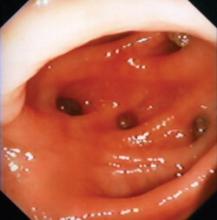A high-fiber diet may help; available evidence doesn’t support other interventions. A high-fiber diet is often prescribed after recovery from acute diverticulitis, based on extrapolation from epidemiologic data showing an association between low-fiber diets and diverticulosis (strength of recommendation [SOR]: C, expert opinion). No direct evidence establishes a role for fiber in preventing recurrent diverticulitis, however.
No evidence supports the common advice to avoid nuts and seeds to prevent diverticulitis. Eating nuts, corn, and popcorn doesn’t increase the risk; in fact, nuts and popcorn may have a protective effect (SOR: B, large cohort study).
There isn’t enough evidence to recommend the anti-inflammatory drug mesalamine or a polybacterial lysate for immunostimulation. Retrospective data don’t support routine prophylactic colectomy after 1 or 2 episodes of acute diverticulitis (SOR: B, observational studies).
Evidence summary
A 2006 Family Physicians Inquiries Network Clinical Inquiry on diverticulosis found inconsistent evidence that fiber decreases the risk of symptomatic diverticular disease (SOR: C, case control studies and a large prospective cohort study).1
A 2007 literature review found no systematic reviews or randomized controlled trials (RCTs) of fiber for preventing complications of diverticular disease. The reviewers noted that observational studies have found less diverticulosis in populations with higher fiber consumption.2
Nuts, popcorn may be protective
A trial conducted as part of a large prospective cohort study—the Health Professionals Follow-up Study—followed 47,228 male health professionals in the United States, ages 40 to 75 years, from 1986 to 2004.3 The subjects, all of whom returned a food-frequency questionnaire, were at baseline free of diverticulosis and related complications, cancer, and inflammatory bowel disease. During the follow-up period, 801 cases of diverticulitis and 383 cases of diverticular bleeding (the main outcome measures) occurred.
The investigators found an inverse association between consumption of nuts and popcorn and risk of diverticulitis. Men with the highest intake of each food (at least twice per week) compared with men with the lowest intake (less than once per month) had a hazard ratio of 0.80 (95% confidence interval [CI], 0.63-1.01; P for trend=.04) for nuts and 0.72 (95% CI, 0.56-0.92; P for trend=.007) for popcorn. No association was noted between corn consumption and diverticulitis or between nut, corn, or popcorn consumption and diverticular bleeding or uncomplicated diverticulosis.
Mesalamine’s efficacy is unknown
A 2007 systematic review found 1 RCT of the anti-inflammatory drug mesalamine (mesalazine, 5-aminosalicylic acid) for preventing diverticulitis. Mesalamine reduced the recurrence rate of diverticulitis from 46% to 15% among 166 subjects.
The reviewers judged the study to be flawed by unreported diagnostic criteria and a high withdrawal rate. They concluded that the effectiveness of mesalamine remains unknown.2


